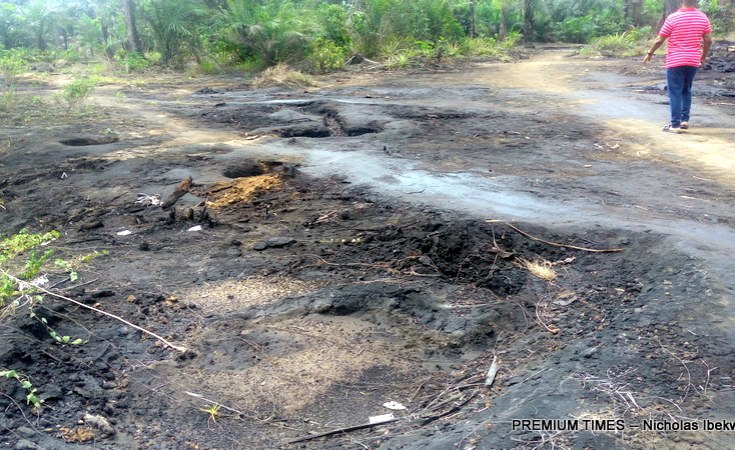Some members of the Niger Delta communities affected by the 2011 Bonga oil spill staged a protest at the Federal Ministry of Justice in Abuja, demanding the enforcement of the award against oil giant, Shell.
Some Nigerians from Niger Delta on Monday called on President Bola Tinubu to compel Shell Nigeria Exploration and Production Company Limited (SNEPCo) to pay $3.6 billion awarded to them as compensation for the 2011 Bonga oil spill.
The group staged a protest at the Federal Ministry of Justice in Abuja, demanding the enforcement of the award.
The protesters led by Federal Johnson implored the government to intervene and ensure Shell was made to fulfil financial obligations before leaving the country.
The Bonga oil spill occurred on 20 December 2011, during Shell's exploration activities in OML 118, located 120 kilometres off Nigeria's coast in the Gulf of Guinea.
The rupture of Shell's export line connected to the Float Production Storage and Offloading (FPSO) vessel led to the release of approximately 40,000 barrels (6.4 million litres) of crude oil into the sea, as reported by the National Oil Spill Detection and Response Agency (NOSDRA).
Over communities across Niger Delta states, particularly, Akwa Ibom, Bayelsa and Delta were said to be affected by the oil spill.
In response to the spill, NOSDRA imposed a $1.8 billion compensation for environmental damages and loss of income on affected communities, and another $1.8 million as a punitive penalty. The liability totalled $3.6 billion.
Shell contested the award at the Federal High Court in Lagos, arguing that NOSDRA's enforcement encroached on judicial and legislative powers.
But despite Shell's objection, the court in its judgement, delivered on 24 May 2018, upheld NOSDRA's authority to impose fines, rejecting the company's claims of constitutional violations.
The judge, Mojisola Olatoregun, said in the judgement that Shell's preference for litigation over compliance with court orders was evident.
The judgement affirmed NOSDRA's duty to assess damages and enforce penalties.
"The Federal High Court in Lagos directed SNEPCo to pay, but they prefer litigation as this strategy would enable them to utilise the money they collected from the insurance company and subject us to perpetual abject poverty," Mr Johnson, the leader of the protesters, said on Monday.
Protest
The protesters, during their peaceful procession at the Federal Ministry of Justice in Abuja on Monday, carried placards with messages urging Shell to respect the court's decision and compensate them before exiting Nigeria.
"We believe that either the government agencies purporting to deal on our behalf have been compromised or they are deliberately conniving with SNEPCo to frustrate payment of our compensation to us.
"We therefore call on policy and decision makers and in particular our dear president, Chief Bola Tinubu to come to our aid for a quick resolution of this matter which has lingered since 2011," Mr Johnson said.
The Attorney-General of the Federation and Minister of Justice, Lateef Fagbemi, was not available to address the protesters. But a woman, presumably an official of the ministry who refused to identify herself, received a signed protest letter from the protesters on behalf of the minister.
Health risks, destruction of livelihood
Mr Johnson later, in a telephone call with our reporter, expressed frustration over the lack of communication from the EFCC on the outcome of its investigation.
According to him, the oil spill has devastated their livelihoods, rendering fishing impossible due to environmental damage and exposing them to various forms of health risks.
"The oil spill has destroyed many livelihoods. We can't go fishing, even though we do use the water a times to bath, but the oil spill has destroyed everything. So we can't fish because fishes can't survive the oil spill.
"Spill occurrences do bring different diseases like cough, catarrh and malaria which are affecting our people. We have been fighting them to pay compensation since 2012 but nothing has been done even after the judgement of the federal high court," he said.
EFCC accused of cover-up
Among their grievances, they said the refusal of the Economic and Financial Crimes Commission (EFCC) to disclose the findings of its investigation into the insurance funds released to SNEPCo for compensation.
"The EFCC invited the valuer and some other people as they investigated the payment, but since then, we have not heard anything from them. The valuer is from the government
"We are now begging the government to use their office to call them to order so that they can pay the money to us, because is the authority of the country."
"Now SNEPCo are planning to leave the country, but before they leave, they should pay us our money," Mr Johnson said.
When contacted by PREMIUM TIMES, EFCC spokesperson, Dele Oyewale, declined to speak on the issue raised by the protesters.
But another top official of the agency who asked not to be named to speak on the issue without authorisation said there is a limit to what EFCC can do concerning the issue because it is a civil matter.
The source recalled that the Supreme Court of the United Kingdom had in May 2023 delivered a ruling in favour of Shell concerning the matter. However, the substantive claim of the affected communities is said to still be pending in a UK court.
"The matter brought to EFCC by the host communities does not involve allegations of financial crime," the source stated. "It is a civil matter that should ideally be resolved directly between the parties involved."
The source reiterated that the commission's mandate primarily encompasses matters related to financial crimes. "The matter they brought to EFCC is a civil matter, which respectfully, should be resolved between the host communities and the affected oil company. They never brought up any issue of financial crime. It's not everything you bring to the EFCC."


